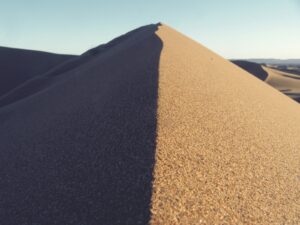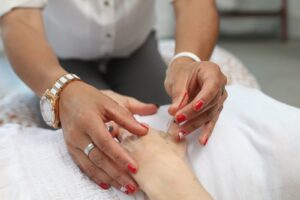Subscribe to the Newsletter
If you are interested in understanding how Traditional Chinese Medicine can improve your life sign up to my newsletter for the latest updates.

In Chinese medicine, Wind is one of the most virulent external causes of disease.
It takes many forms. At one end of the spectrum, air passes gently through leaves. At the other end, you get the destructive force of a hurricane.
In the same way, in Chinese medicine Wind symptoms take many forms, from mild to very serious.
One thing is common to them all: movement.
For example, you may find yourself moving involuntarily, as in
It also arises in the body from other sources.
Although it is tempting to regard it as being purely external, if we say that an individual has had an invasion of Wind, it is the individual’s reaction to the invader that we are describing, not that we expected a windy day to have been the trigger. Such a day might or might not have been a cause.
In other words, whether or not the patient had been exposed to the wind as it blows the leaves on trees, or modern equivalents like
he would be described as having a Wind invasion if his symptoms included enough of the following. As you’ll see, there are two kinds, External and Internal:

This is different. ‘Internal wind’ arises from what is called internal deficiency.
Although there are some similarities to external wind, internal wind arises not from one of the external causes of disease but from an internal deficiency, such as deficient Blood, or Yin Deficiency.
However, it can be triggered by exposure to one of the external causes of disease.
Internal Wind can be harder to treat and to cure. That’s because the underlying deficiency has probably arisen over time and will take time to cure. So that means that, though occurring at all ages, it occurs more often as you grow older.
For example the slight tremor that many older people have, especially if they are nervous, is an example of Internal Wind. Another form of Wind that older people, especially, suffer from is shingles which starts with an itch. Itching makes you scratch. Scratching is a movement so has the properties of Wind.
Read about one example at Liver Wind.
Very often, Wind invades in company with Cold (Wind Cold) or Heat (Wind Heat).
A major school of acupuncture was founded around 1400 years ago in China: the School teaching Cold Invasion. Read more: Six Stages of Disease caused by Invasion of Cold – Acupuncture Points (acupuncture-points.org)
Then about 1000 years later, the School teaching how Heat Invades was set up: Four Levels: How ‘Warm’ Diseases Penetrate – Acupuncture Points (acupuncture-points.org)
If all this is new to you, don’t bother clicking those two links – it all gets a bit technical!
What indeed! This is a big subject, far bigger than you might imagine … hence the pages mentioned above on invasion of Cold in Six Stages and invasion of Heat: the four levels.
If you want to get better without complications, then it’s best not to take painkillers that quell pain, fever and perspiration. (Why Not? Read our page on Suppression.)
I would go further and suggest that if you take such medications, your problem will last longer and may potentially leave you with other ongoing issues which you don’t associate with your Wind invasion but which began after you ‘suppressed’ it. These will include ongoing tiredness, conditions caused by Damp, and possibly onset of Phlegm.
And you will probably be more susceptible to the next Wind invasion.

Very roughly, as regards herbal treatment, it comes down to whether you are feeling hot or cold, and whether you are perspiring. (I’m pretty sure nerdy colleagues will take issue with me on some of the following.)
… and the condition is still in the acute stage – ie you got like this very recently, meaning yesterday or today – let yourself sweat it out.
Don’t stand in a draft of cold air, however!! That might make it worse. Instead, wrap up and let yourself sweat it out. Go to bed, if possible, keep warm, and try to pour sweat!
Normally, that’s enough and you’ll soon get better. Drink plenty of water or warm green tea. When better, keep warm and rest.
then try to decide if you prefer warmth or cold.
In other words,
If you are feeling chilled and prefer warmth, you need herbs that are warming and which ‘release’ the exterior. These include warming herbs that make you sweat like Cinnamon, backed by ginger. I’ve written a recipe for a ‘toddy’ for this: see Cold: An External Problem that Internalises – Acupuncture Points (acupuncture-points.org)
You could also try taking a hot bath: hot enough to make you start sweating within 15 minutes. (Take care if pregnant, very old, very young, heart condition etc!). Or a sauna or steam-room until you perspire heavily. After you start sweating heavily, don’t take a cold shower! Dry off, get dressed and keep warm. (Cold showers are a great way to keep fit, but they aren’t always appropriate, and certainly not here.)
Young fit people could try playing a game of squash, or a fast run: both to bring on perspiration (but keep wrapped up when sweating!)
Theoretically, eating a little warm food may help if you are exhausted, but often it’s better to just take the warming ‘toddy’ (recipe here) and let your body get on with it. Loading it with food forces it to divert energy away from heating you up to the point when you perspire and instead towards dealing with what you’ve eaten.
On the other hand, if you feel hot, yet are not perspiring, you need herbs that help you sweat, and yet are cooling. These are cool, acrid herbs like mint, chryanthemum flower, great burdock fruit and white mulberry leaf. You should be able to get the mint (you may have it growing in your garden and there’s a picture up above). The chrysanthemum flower is probably available from your local Chinese grocery store. Brew them up and sip frequently.
And/Or go to bed and sweat it out. (Take care to keep wrapped up because, when sweating, your pores are ‘open’ making them more susceptible to yet more invasion by Wind!)
A hot bath or sauna for you? Not sure. You probably wouldn’t like it – and it might just overload you, so probably better avoided.
If you know how to do cupping (see my comprehensive page on cupping and precautions to take) then cupping is usually a great way to help yourself, by which I mean getting someone else to do some cupping on your upper back.

Normally it would be on the muscles that lie between your shoulder-blades and either side of your spine: it will probably be sore to pressure where your friend should place the cups.
The places you find it most beneficial will probably be Back Shu points. But don’t worry about getting them exactly: cup where you feel you need it.
Your body expends a fair amount of energy combating Wind. Consequently, after a Wind attack, you may be left with what we call Lung Qi deficiency.
That means you need rest, sleep and simple nourishment, avoiding sugary, sweet, raw and cold foods – for more see nutrition.
Make sure you eat warm foods, and chew them well. And not too much food at a time: a few small meals are better.
Read about the other external causes of disease:

Stay in Touch!
No spam, only notifications about new articles and updates.

Book a Video consultation if you want to know more about your symptoms

This Introductory Chinese medicine course introduces you to the amazing thinking behind this ancient medicine, now increasingly in demand.

The Scottish College for Chinese medicine provides introductory courses for all, explaining Chinese medicine and its cultural background.

Master Tung’s acupuncture is a hidden treasure, lost to China but recovered in Taiwan from where it spread round the world.

Knee pain has five main causes. It’s certainly worth trying acupuncture before you resort to surgery!
Subscribe to the Newsletter
If you are interested in understanding how Traditional Chinese Medicine can improve your life sign up to my newsletter for the latest updates.
Subscribe to the Newsletter
If you are interested in understanding how Traditional Chinese Medicine can improve your life sign up to my newsletter for the latest updates.